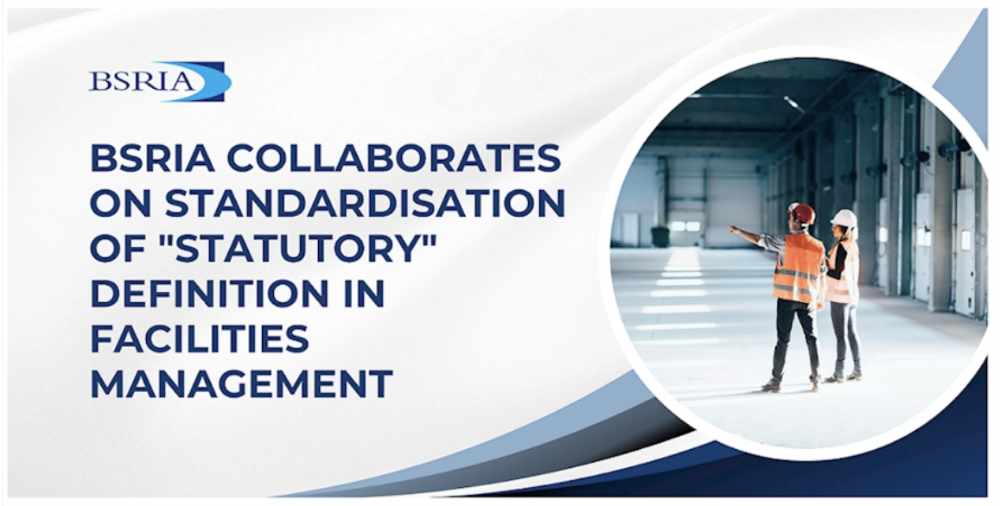BSRIA collaborates to establish common definition of Statutory in workplace and facilities management
BSRIA is pleased to announce its role in a major collaborative effort to establish a standard definition of "statutory" within the workplace and facilities management (WFM) sector. This initiative, in partnership with SFG20 (part of the Building Engineering Services Association (BESA)), the Chartered Institution of Building Services Engineers (CIBSE), and the Institute of Workplace and Facilities Management (IWFM), aims to standardise the interpretation and application of statutory requirements across the industry.
The agreement, facilitated by IWFM’s Procurement and Contract Management Special Interest Group (SIG), addresses the need for consistency in WFM contracts. Historically, varied interpretations of statutory requirements have led to compliance issues and potential risks of non-compliance.
The agreed definition of "statutory" encompasses anything required by primary legislation, such as Acts of Parliament, and secondary legislation, like Statutory Instruments. It also includes specific activities outlined in government guidance and Approved Codes of Practice (ACoPs) from agencies like the Health and Safety Executive (HSE), as well as industry standards and guidance from professional bodies.
This unified definition aims to raise standards, reduce ambiguity in contractual specifications, and ensure properties consistently meet statutory requirements. BSRIA is honoured to contribute to this important initiative, supporting the industry in achieving clear and consistent compliance standards.
The full statement defining "statutory" is as follows:
"The term 'statutory' denotes anything required by primary legislation such as Acts of Parliament and secondary legislation such as Statutory Instruments (including Regulations). When working to achieve statutory compliance, primary and secondary legislation often focuses on general outcomes rather than prescribing specific activities. The specific activities required to meet statutory compliance may, therefore, be included in government guidance and Approved Codes of Practice (ACoPs) published by agencies such as the Health and Safety Executive (HSE), or other industry standards and/or guidance (BSI standards, publications by trade associations and professional bodies, etc). In the absence of a traceable reference to legislation, following industry standards and/or guidance may assist in discharging duties under the statutory requirements. For example: in relation to electrical installations, The Health and Safety at Work etc. Act 1974 led to the Electricity at Work Regulations 1989. This, in turn, is supported by the HSE issued guidance note HSR25 which also references British Standard 7671, which is supported by an on-site guide."
This article appears on the BSRIA news and blog site as 'BSRIA Collaborates to Establish Common Definition of "Statutory" in Workplace and Facilities Management' dated May 2024.
--BSRIA
[edit] Related articles on Designing Buildings
- BSRIA articles.
- Non-statutory consultees for planning permission.
- Non statutory consultees
- Statutory.
- Statutory approvals for buildings.
- Statutory authorities.
- Statutory consultee.
- Statutory declaration excluding security of tenure.
- Statutory formulae for rating valuation.
- Statutory instruments.
- Statutory obligations.
- Statutory permissions.
- Statutory planning notices
- Statutory Procedures for Planning.
- Statutory sick pay.
- Statutory undertakers.
Featured articles and news
Latest Build UK Building Safety Regime explainer published
Key elements in one short, now updated document.
UKGBC launch the UK Climate Resilience Roadmap
First guidance of its kind on direct climate impacts for the built environment and how it can adapt.
CLC Health, Safety and Wellbeing Strategy 2025
Launched by the Minister for Industry to look at fatalities on site, improving mental health and other issues.
One of the most impressive Victorian architects. Book review.
Common Assessment Standard now with building safety
New CAS update now includes mandatory building safety questions.
RTPI leader to become new CIOB Chief Executive Officer
Dr Victoria Hills MRTPI, FICE to take over after Caroline Gumble’s departure.
Social and affordable housing, a long term plan for delivery
The “Delivering a Decade of Renewal for Social and Affordable Housing” strategy sets out future path.
A change to adoptive architecture
Effects of global weather warming on architectural detailing, material choice and human interaction.
The proposed publicly owned and backed subsidiary of Homes England, to facilitate new homes.
How big is the problem and what can we do to mitigate the effects?
Overheating guidance and tools for building designers
A number of cool guides to help with the heat.
The UK's Modern Industrial Strategy: A 10 year plan
Previous consultation criticism, current key elements and general support with some persisting reservations.
Building Safety Regulator reforms
New roles, new staff and a new fast track service pave the way for a single construction regulator.
Architectural Technologist CPDs and Communications
CIAT CPD… and how you can do it!
Cooling centres and cool spaces
Managing extreme heat in cities by directing the public to places for heat stress relief and water sources.
Winter gardens: A brief history and warm variations
Extending the season with glass in different forms and terms.
Restoring Great Yarmouth's Winter Gardens
Transforming one of the least sustainable constructions imaginable.


























